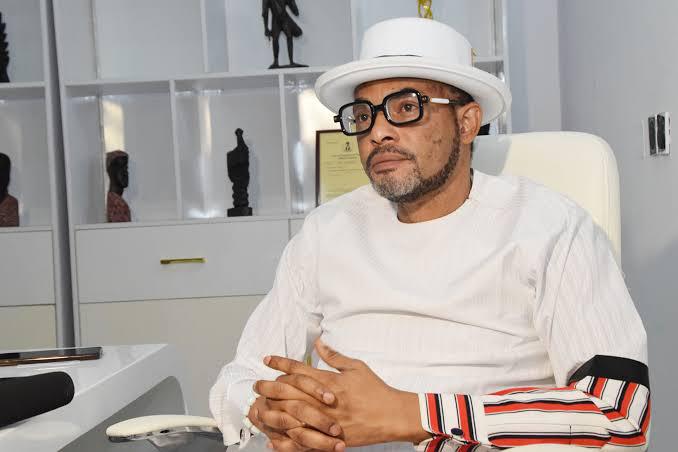On Sunday, August 24, 2025, Mingus Reedus, the 25-year-old son of The Walking Dead actor Norman Reedus and supermodel Helena Christensen, was spotted outside his New York City apartment, just one day after his arrest for allegedly assaulting his girlfriend. The incident, which has sparked significant media attention and public discourse, saw Mingus confront reporters with a provocative question: “You want to watch me kill myself?” The young model, dressed in the same green shorts and black T-shirt he wore to court, was seen carrying his cat in a bag, adding a peculiar detail to an already tumultuous scene. His behavior, including reportedly calling a reporter “ugly” while leaving Manhattan Criminal Court on Saturday, August 23, has fueled discussions about celebrity privilege, domestic violence, and the pressures of living in the public eye. This article delves into the details of the allegations, the legal proceedings, the public’s reaction, and the broader implications for Mingus, his family, and society’s approach to such cases.
The Incident and Arrest: Allegations of Assault
The controversy surrounding Mingus Reedus began on Friday, August 22, 2025, when New York City police arrested him at his Manhattan apartment following a reported altercation with his 33-year-old girlfriend, whose identity has not been disclosed. According to police reports, Mingus is alleged to have punched his girlfriend in the leg, choked her, and slammed her to the ground during a domestic dispute. The severity of the allegations has led to multiple charges, including criminal obstruction of breathing, third-degree assault, reckless physical injury, aggravated harassment, and second-degree harassment. These charges reflect a range of offenses under New York law, from physical violence to actions that cause fear or distress, highlighting the seriousness of the incident.
Mingus, who has pursued a career in modeling like his mother, Helena Christensen, pleaded not guilty to all charges during his arraignment at Manhattan Criminal Court on Saturday, August 23. His plea sets the stage for a legal battle that will likely draw significant attention due to his high-profile lineage and the nature of the accusations. The court appearance was marked by Mingus’s confrontational behavior, as he reportedly insulted a reporter by calling them “ugly” while exiting the courthouse, a moment that was captured by media outlets and quickly circulated online.
The details of the alleged assault paint a disturbing picture. Criminal obstruction of breathing, a charge that involves impeding a person’s ability to breathe, is considered a serious offense in New York, often associated with domestic violence cases. Third-degree assault and reckless physical injury suggest physical harm, while aggravated and second-degree harassment charges indicate actions intended to intimidate or distress the victim. The combination of these charges suggests a multifaceted incident, potentially involving both physical and emotional abuse, though the full details remain subject to legal proceedings and investigation.
Mingus Reedus: A Life in the Spotlight
Mingus Lucien Reedus, born on October 13, 1999, in Copenhagen, Denmark, is the only child of Norman Reedus and Helena Christensen, two figures who have left indelible marks on their respective industries. Norman Reedus, 56, is best known for his role as Daryl Dixon in AMC’s The Walking Dead, a cultural phenomenon that ran from 2010 to 2022 and spawned multiple spin-offs, including The Walking Dead: Daryl Dixon. Helena Christensen, 55, is a Danish supermodel and photographer, celebrated for her work with Victoria’s Secret and major fashion brands in the 1990s. The couple dated from 1998 to 2003, and while they never married, they have co-parented Mingus, maintaining a cordial relationship in the public eye.
Growing up with such prominent parents, Mingus has lived a life under scrutiny, balancing the privileges of celebrity with the pressures of carving out his own identity. He followed in his mother’s footsteps, pursuing a career in modeling and walking runways for designers like Alexander McQueen and Versace. His distinctive features, including his striking resemblance to both parents, have made him a recognizable figure in the fashion world. However, his relatively low-key public persona has kept him out of major controversies until now, making the assault allegations a jarring departure from his previous image.
Mingus’s arrest comes at a time when he is navigating the transition from a celebrity offspring to an independent figure in his own right. At 25, he is at a crossroads, seeking to establish his career while managing the expectations that come with his lineage. The incident has thrust him into a harsh spotlight, raising questions about how his parents’ fame and his own public profile will influence the legal and public response to the case.
The Public Encounter: A Provocative Outburst
On Sunday, August 24, Mingus was spotted outside his Manhattan apartment, just one day after his court appearance. Dressed in the same green shorts and black T-shirt he wore to court, he carried his cat in a bag, a detail that added an element of oddity to the scene. His interaction with reporters was marked by a provocative and troubling statement: “You want to watch me kill myself?” The comment, reported by multiple media outlets, has sparked concern about Mingus’s mental state, as well as debate about whether it was a genuine cry for help or a rhetorical outburst aimed at deflecting attention.
The statement, combined with his earlier insult to a reporter, paints a picture of a young man under significant pressure. The media frenzy surrounding his arrest, coupled with the weight of the allegations, may have contributed to his confrontational demeanor. For onlookers, the comment raises questions about the toll of public scrutiny on individuals involved in high-profile legal cases, particularly those with famous parents. While Mingus’s outburst may have been an impulsive reaction, it has amplified the narrative of a troubled young man, complicating his public image as he navigates the legal process.
Legal Implications: A Complex Case Ahead
Mingus’s not guilty plea sets the stage for a complex legal battle that will likely hinge on evidence, witness testimony, and the credibility of both the accuser and the accused. The charges against him—criminal obstruction of breathing, third-degree assault, reckless physical injury, aggravated harassment, and second-degree harassment—carry varying degrees of severity under New York law. Criminal obstruction of breathing, a misdemeanor, can result in up to one year in jail, while third-degree assault and reckless physical injury also carry potential jail time and fines. Harassment charges, particularly aggravated harassment, may involve penalties for actions intended to intimidate or cause distress, such as threats or abusive language.
The prosecution will need to present evidence supporting the girlfriend’s account, which may include medical records documenting injuries, witness statements, or physical evidence from the scene. Mingus’s defense team, likely backed by the resources of his high-profile family, will aim to challenge the allegations, potentially arguing that the incident was exaggerated or misinterpreted. The absence of prior criminal history for Mingus, if applicable, could bolster his defense, as could any evidence suggesting mutual conflict or provocation.
The case also raises questions about domestic violence laws and their application in high-profile cases. New York has stringent policies on domestic violence, with mandatory arrests in cases where police find evidence of physical harm. The allegations of choking and slamming the victim to the ground suggest a serious incident, but the defense may seek to contextualize the events, possibly arguing that the altercation was not one-sided. The outcome of the case will depend on the strength of the evidence and the ability of both sides to present their narratives effectively.
Public Reaction: A Divided Response
The news of Mingus Reedus’s arrest has elicited a divided response from the public, amplified by social media platforms like X. Fans of Norman Reedus and Helena Christensen, as well as followers of Mingus’s modeling career, have expressed a range of emotions, from shock and disappointment to support and skepticism. Hashtags such as #MingusReedus and #NYCArrest have trended, with users debating the allegations and their implications.
Some have condemned Mingus, arguing that the charges reflect a serious issue of domestic violence that must be addressed regardless of his celebrity status. “No one is above the law,” one user wrote on X. “If he did this, he needs to face the consequences, famous parents or not.” Others have expressed concern for the alleged victim, emphasizing the importance of supporting survivors of domestic violence. The age difference between Mingus (25) and his girlfriend (33) has also sparked discussion, with some questioning the dynamics of their relationship.
Conversely, a segment of fans has rallied to Mingus’s defense, citing his not guilty plea and the lack of confirmed details. “Let’s wait for the facts before judging,” one supporter posted. “The media loves to sensationalize anything involving celebrities.” Some have pointed to Mingus’s provocative comments to reporters as evidence of emotional distress, suggesting that he is struggling under the weight of public scrutiny. The involvement of his parents, both of whom have large fanbases, has further complicated the narrative, with some fans defending Mingus out of loyalty to Norman or Helena.
The Role of Celebrity Privilege
The case has reignited discussions about celebrity privilege and its influence on legal and public outcomes. As the son of two high-profile figures, Mingus benefits from resources that many defendants do not, including access to top-tier legal representation and a platform to shape public perception. His parents’ fame, while a source of opportunity, also amplifies the scrutiny he faces, as media outlets and the public are drawn to the drama of a celebrity offspring in trouble.
Norman Reedus and Helena Christensen have not publicly commented on the arrest as of August 25, 2025, likely to avoid prejudicing the legal process or fueling further media attention. However, their silence has not deterred speculation about their involvement. Norman, known for his private nature despite his public persona, has previously spoken about his close relationship with Mingus, describing him as a “great kid” in interviews. Helena, who has worked closely with Mingus in the fashion industry, has also praised his creativity and independence. Their response to the allegations, whether private or public, will likely play a significant role in shaping the narrative moving forward.
The case also raises questions about how celebrity status influences legal proceedings. High-profile defendants often face intense media scrutiny, which can pressure prosecutors to pursue charges aggressively to avoid accusations of leniency. Conversely, wealth and connections can provide advantages, such as bail access or favorable plea deals. Mingus’s ability to walk freely outside his apartment the day after his arrest suggests he was released on bail or his own recognizance, a privilege not always afforded to less prominent defendants.
Domestic Violence: A Broader Societal Issue
The allegations against Mingus Reedus highlight the broader issue of domestic violence, which remains a pervasive problem globally and in the United States. According to the National Coalition Against Domestic Violence, 1 in 4 women and 1 in 9 men experience some form of intimate partner violence in their lifetime, with physical assault, choking, and harassment being common forms of abuse. The charges against Mingus, particularly criminal obstruction of breathing, align with patterns of domestic violence that can have severe physical and psychological consequences for victims.
The case underscores the importance of addressing domestic violence allegations promptly and thoroughly, regardless of the accused’s status. Public awareness campaigns, such as those led by organizations like the National Domestic Violence Hotline, emphasize the need for survivors to seek help and for communities to hold perpetrators accountable. The age and power dynamics in Mingus’s relationship, with an eight-year age gap and his celebrity background, may also prompt discussions about how privilege and fame can complicate issues of consent and accountability.
Mental Health and Public Pressure
Mingus’s provocative comment to reporters—“You want to watch me kill myself?”—has raised concerns about his mental health and the pressures of facing legal and public scrutiny. While the remark may have been hyperbolic or intended to shock, it highlights the emotional toll of high-profile controversies, particularly for young individuals navigating fame. The intersection of mental health and domestic violence is complex, as stress, trauma, or untreated mental health issues can contribute to volatile behavior, though they do not excuse violence.
The incident also reflects the broader challenges faced by celebrity offspring, who often struggle to establish their identities under the shadow of their parents’ fame. Mingus, as the child of two global icons, has faced expectations to succeed in a competitive industry while managing the public’s fascination with his personal life. The arrest and subsequent media frenzy may exacerbate these pressures, underscoring the need for mental health support for individuals in similar situations.
The Path Forward: Legal and Personal Challenges
As Mingus Reedus prepares for his legal battle, the path forward will be fraught with challenges. His defense team will likely focus on discrediting the allegations, possibly by questioning the consistency of the girlfriend’s account or presenting evidence of mutual conflict. The prosecution, meanwhile, will aim to build a strong case based on physical evidence, medical reports, and any corroborating witnesses. The outcome of the case will hinge on the quality of evidence and the effectiveness of both sides’ arguments.
Publicly, Mingus faces the task of managing his image amid intense scrutiny. His confrontational behavior toward reporters suggests a defensive posture, but a more strategic approach—such as a public apology or a commitment to addressing the allegations responsibly—could help mitigate the damage. The involvement of his parents, whether through public statements or private support, will also shape the narrative, as their fanbases remain influential in shaping public opinion.
For the alleged victim, the case represents a pursuit of justice and accountability. Domestic violence cases often place survivors in a difficult position, particularly when the accused is a public figure. The media attention surrounding the case may amplify her experience, for better or worse, highlighting the need for support systems to protect and empower survivors.
Broader Implications for Celebrity Culture
The Mingus Reedus case is a microcosm of broader issues in celebrity culture, from the pressures of fame to the complexities of addressing domestic violence in the public eye. It raises questions about how society judges high-profile individuals, balancing their personal failings with their public contributions. For Norman Reedus and Helena Christensen, the incident is a personal challenge, as they navigate their son’s legal troubles while maintaining their own careers and reputations.
The case also underscores the role of social media in amplifying controversies. Platforms like X have given the public a direct line to react to and shape narratives, often with little regard for nuance or verified information. The viral spread of Mingus’s comments and the allegations against him illustrates the speed with which stories can escalate, leaving little room for deliberation or privacy.
Conclusion: A Test of Accountability and Redemption
The arrest of Mingus Reedus on August 22, 2025, for allegedly assaulting his girlfriend has thrust the young model into a storm of legal and public scrutiny. The charges—ranging from criminal obstruction of breathing to harassment—paint a troubling picture, while his provocative interactions with reporters, including the alarming question “You want to watch me kill myself?” suggest a young man grappling with the weight of the allegations and the media frenzy. As the son of Norman Reedus and Helena Christensen, Mingus’s case carries added significance, raising questions about privilege, accountability, and the pressures of fame.
As the legal process unfolds, the case will test the principles of justice and fairness, both in the courtroom and in the court of public opinion. For Mingus, it is an opportunity to confront the allegations head-on, whether through a robust defense or a path toward accountability and personal growth. For society, it is a reminder of the complexities of domestic violence, the impact of celebrity culture, and the need for empathy and rigor in addressing such cases. The road ahead for Mingus Reedus will be challenging, but it may also offer a chance for redemption and a deeper understanding of the responsibilities that come with living in the spotlight.






